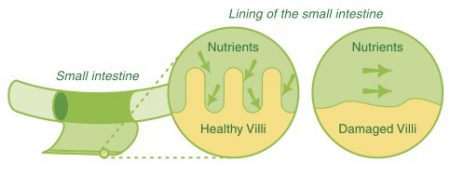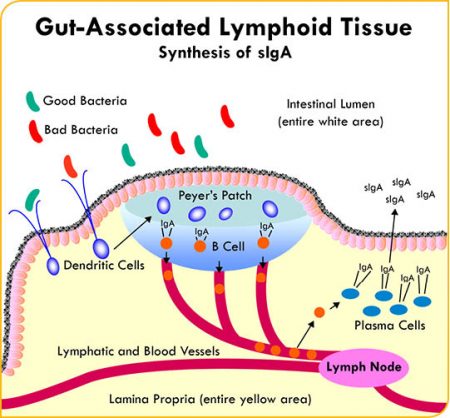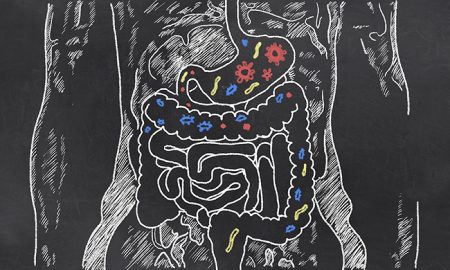Digestion has always been a huge focus in naturopathic medicine. Naturopathic Doctors have always seen the digestive system as one of the most foundational pieces of health. The old saying “Let Food Be Thy Medicine” is fundamental to natural health, and works only as good as your digestive organs do! Our body needs tons of nutrients to fuel us and without proper digestion, absorption and transportation of those nutrients we see tons of different health issues. Almost every piece of health, be it mental health, immune health, hormones, skin, energy, or urinary/reproductive health is influenced by our digestion. This article will highlight some of biggest connections between the immune system and our digestion!
What is a healthy digestion?
This is a huge topic, but really briefly a healthy digestive system includes – daily easy to pass bowel movements (types 3-4 on the bristol stool chart are ideal, with 1-3 movements daily), minimal gas and burping, no bloating, and feeling energized after meals (vs like you need a nap). Being able to eat a wide range of fruits and vegetables is super important, and enough variety in proteins/grains/legumes to feel satisfied and full is always the goal! When we are able to have all of the above, we support a healthy gut microbiome (good bugs/probiotics) and that improves overall health
Microbiome: good bugs = good immune health
Our immune system is highly linked to our microbiome. In all species studied, humans, animals, insects, we see increased risk of infections when we disrupt the gut microbiome. Healthy bugs in our gut feed off of prebiotics – vegetable fibers. Probiotics, in supplements or fermented foods, help introduce more beneficial bacteria to our digestion. In studies we see different types of probiotics improving function of cells that kill bad viruses and bacteria (NK cells and macrophages), supporting our defence systems (IgA production by B Cells), and modulating inflammation (cytokine profiles).
Digestive Organs Functions
In order for our microbiome to properly use the prebiotics we need, and for us to absorb all the vitamins and minerals from the food we eat, we need the help of our digestive organs to break food down.
Mouth and saliva – physically breaks down food and saliva enzymes start breaking down food. The more you chew, the better!
Stomach – secretes gastric juices, acid and enzymes to kill off bad bugs and break down food.
Liver and Gall Bladder – The liver secretes bile to the gallbladder which goes into the small intestine. Bile is essential for fat absorption and healthy cholesterol function (important for hormone health). Some of our biggest immune vitamins, A, D, and E, are all fat-soluble so we need to eat them with healthy fats and have good bile production to absorb them. Additionally our liver get nutrients back from the small intestine and help process them in to useful materials for our body. While it’s doing all this it is also detoxing any harmful substances that come into our body, most notably sugar, alcohol, chemicals, and drugs. Because of all the hard our liver does everyday it is one of my favourite organs to support with natural medicines
Small Intestine – This organ is incredible. the average human small intestine (SI) is 16 feet long and 1 inch around and has a surface area about 500 times that because of all the small villi and micro-villi in it. Nutrition wise this is where most of our nutrients are absorbed. We get enzymes from our pancreas and our bile into here to help break down food into it’s micro-nutrients. Villi can be damaged by multiple factors including celiac disease, exposure to food sensitivities, irritable bowel disease, small intestinal bacterial overgrowth, food poisoning/chronic diarrhea, and drugs such as PPIs (heartburn medication), NSAIDs (pain meds like advil) and SSRIs (depression medications). Because so many of those damaging factors are so prevalent in our society, I see the small intestines of my patients to frequently need a lot of support.

from gfjules.com/celiac-disease
In the SI there is a TON of different immune cells and defence layers. The Small and large intestine is were most of our microbiome lives, and the SI has multiple layers of mucus, layer of intestinal walls and immune cells. The immune cells made in our gut are used all over our body. Some research shows that our gut-associated lymphoid tissue (GALT, or gut immune cells for short) is where 70% of our immune system is made. These GALT cells produce anti-bodies, are involved in allergy symptoms, create or moderator autoimmune disease, and obviously attack bad bugs that get in us. All of these pieces help our gut notice and respond to invaders, attack them, and sweep them out as needed. These immune cells are always balancing to create a strong enough immune response to clear out infections, while also allowing adequate absorption of nutrients.

Immune system in our Small Intestine. pic from https://www.embriahealth.com/products/epicor/research/mode-of-action-summary-on-all-studies/slga-antibody
How to Support Your Digestive Immune System
There are so many great ways to support your digestion, but the biggest is probably just to eat tons of vegetables and a varied diet. Like I mentioned in the probiotics section we need healthy fibres to feed our healthy gut bacteria, and so many vitamins and minerals are found in a balanced diet.
Support your Gastric Juices – many people don’t have enough gastric juices in our stomach to kick of the digestive process. Traditionally bitter foods and herbs, vinegars, and cooking smells help stimulate the production of our gastric processes but with a trend towards more sweet foods and premade foods it has become too easy to shove food down our gullets before our digestion is really ready! Apple cider vinegar or herbal bitters before meals is my go to. Cooking at home helps kick off our sense of smell , eating pickles and ferments or vinegary salad and appetizers (as is done in many traditional food cultures) helps get your stomach ready for the main event.
Figure out your Food Sensitivities – not everyone has food sensitivities, for for folks who do removing them or limiting them from you diet is super important. When we can’t digestive a food properly, be it from lack of specific enzymes or low gastric juices or immune reactions to it it creates inflammation in our gut which can interfere with not just our immune and digestive system but also our skin and cause other symptoms like headache, fatigue and joint pain. The most common food sensitivities I see are gluten, eggs, and dairy. I recommend people take a food out of their diet strictly for 3-4 weeks, then reintroduce it slowly and see how you feel. That method is the gold standard in medicine for determining food allergies, and is similar to what is done on elimination diets and cleanses. If you find you have multiple food intolerances you might have something called leaky gut or small intestinal bacterial overgrowth. Contact me or your ND to help you figure that out!
Ferments from Food and Supplements – as a someone with German and Ukrainian heritage i always have some homemade sauerkraut in my fridge. Other homemade ferments, like kimchi, kombucha, kefir, yogurt are great and affordable ways to get a wide spectrum of probiotics into our gut. Store bought probiotic foods are great to, just make sure they come from the fridge section so they stay “alive”. Probiotic supplements have tons of research supporting all kind of health and are an option for people who need extra support or who don’t have a taste for ferments yet 🙂
View this post on Instagram
Love your Liver – Once you get all those good foods and supplements in you, it’s up to your liver to put them to work. Avoiding liver stressors (alcohol, drugs of all kinds, sugar, etc) and eating liver loving foods is great. There is tons of herbs that help support the liver as well like dandelion root, milk thistle, turmeric and oregon grape root.
In Summary
It’s all connected! For good health, especially immune health, getting your digestion on track is KEY. Try playing around with different parts of your diet and definitely try to eat meals with half your plant full of fruits and veggies. Stimulate your gastric juices, love your liver, and dive into the funky world of fermentated foods! And when in doubt reach out for help from me!
References:
Gourbeyre, Denery, Bodinier. Probiotics, prebiotics, and synbiotics: impact on the gut immune system and allergic reactions. Journal of Leukocyte biology. (2011) doi:10.1189/jlb.1109753
Hofmann AF. The Continuing Importance of Bile Acids in Liver and Intestinal Disease. Arch Intern Med. 1999;159(22):2647–2658. doi:10.1001/archinte.159.22.2647
The Structure and Function of the Digestive System. The Cleveland Clinic, 2018.
Mahadev, S., Murray, J.A., Wu, T.‐T., Chandan, V.S., Torbenson, M.S., Kelly, C.P., Maki, M., Green, P.H.R., Adelman, D. and Lebwohl, B. (2017), Factors associated with villus atrophy in symptomatic coeliac disease patients on a gluten‐free diet. Aliment Pharmacol Ther, 45: 1084-1093. doi:10.1111/apt.13988
Ensari, Arzu, and Michael N Marsh. Exploring the villus. Gastroenterology and hepatology from bed to bench vol. 11,3 (2018): 181-190. PMID: 30013740
Brown, E. M., Sadarangani, M., & Finlay, B. B. (2013). The role of the immune system in governing host-microbe interactions in the intestine. Nature immunology, 14(7), 660–667. doi:10.1038/ni.2611
Jiao, Yuhao et al. Crosstalk Between Gut Microbiota and Innate Immunity and Its Implication in Autoimmune Diseases. Frontiers in immunology vol. 11 282. 21 Feb. 2020, doi:10.3389/fimmu.2020.00282
Li, X. V., Leonardi, I., & Iliev, I. D. (2019). Gut Mycobiota in Immunity and Inflammatory Disease. Immunity, 50(6), 1365–1379. doi:10.1016/j.immuni.2019.05.023
Shakoor Z, AlFaifi A, AlAmro B, AlTawil LN, AlOhaly RY. Prevalence of IgG-mediated food intolerance among patients with allergic symptoms. Ann Saudi Med. 2016 Nov-Dec;36(6):386-390.PMID:27920409
